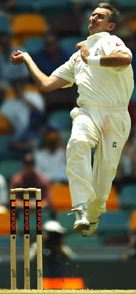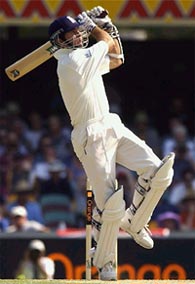England reveal their source of optimism
Daniel Laidlaw
When the first Test is over, and England have an opportunity to review their
performance, they will certainly rue Nasser Hussain's decision to bowl first
and the loss for the tour of speedster Simon Jones. What they should also
regret, whether the match is saved or not, is that the team with the spirit
with which they expected to confront Australia turned up a day late. That,
while it wouldn't have made the first two pieces of ill luck and ill
judgement redundant, would have gone quite a way towards diminishing their
importance.
It doesn't seem like a big deal to restrict an opponent at 364/2 to 492 all
out. It's still almost 500, which leaves little in the way of celebration or
satisfaction. But when you consider Australia's superiority on day one -- Hayden and Ponting's relaxed authority, the missed chances, the captain's
decision that got them in that position -- the fact England were a bowler
short and that Australia didn't lose their third wicket until 378, a
collapse of 8/114 represents a commendable fightback.
Australia really should have, and would have wanted to, post 600. To be kept
under 500 was quite a turnaround, of a type they have frustratingly endured
too often in the last 12 months after the brilliant starts afforded them by
the top three, and helped emphasise how poor England were on day one.
It's like the tourists have played the first days two days in reverse.
Obviously, what they should have done was send Vaughan and Trescothick in
first, make a positive statement to the Australian attack, and then proceed
to get amongst the wickets, which is what happened Friday, in reverse order.
England convincingly won day two, which was unthinkable 24 hours earlier
when the first day conformed to all expectations. They finally showed
Australia the kind of cricket they have played against other sides but for
whatever reason were unable to produce at home last year.
 A day too late, Australia were made to really earn their runs. Hayden had a
massive score for the taking but bizarrely came out playing loosely, in the
undisciplined frame of mind that characterised his play for a while after he
had reached his hundred. For a man who loves to bat out days and possesses
the single-minded nature to make huge scores, with more stamina a triple
century would not have been unrealistic.
A day too late, Australia were made to really earn their runs. Hayden had a
massive score for the taking but bizarrely came out playing loosely, in the
undisciplined frame of mind that characterised his play for a while after he
had reached his hundred. For a man who loves to bat out days and possesses
the single-minded nature to make huge scores, with more stamina a triple
century would not have been unrealistic.
Andy Caddick continued his puzzling trend of beginning poorly and bouncing
back that sees him average significantly better in the second innings than
the first. Uninspiring on day one, he belatedly found something, holding
Waugh - there's only one of them now - and Martyn in check. Martyn never got
going to be the gloriously economical strokeplayer he can and despite
Trescothick, trying his level best to provide him a second chance, held a
catch at the second attempt when an edge was finally found.
Waugh was made uncomfortable and, worryingly, fell to the leg trap.
Ordinarily he'll look awkward against bowling aimed at his body but never
get out to it; this time he gloved Caddick to leg gully. England have their
strategy to him in place and if it happens twice it becomes a trend. Sharjah
earned him respite, but without consistent runs this series pressure will
never be far away.
Australia's middle order lacked the steel to finish the job. The period of
improved bowling, a lax shot by Martyn and the dismissal of Waugh was enough
to interrupt their momentum and see the innings cough to a disappointing
end.
Gilchrist over-ambitiously drove expansively to be caught in the gully off
White, whose natural inswing to the right-handers suddenly seemed like more
of an asset against the lefties. That meant Australia had lost 4/37,
insufficient return on the scintillating start. Only Warne's belligerence
propelled Australia onwards, seizing the initiative from a rattled England
in a post-lunch period of 7 overs for 46 runs. Lehmann, scratchy for his 30
upon his return to the side, was enticed by Giles to drive loosely to cover.
 Only when England batted did we really see the source of their optimism. Representing the New England, which is positive and confident as opposed to defensive and meek, Vaughan and Trescothick proved, just in case it wasn't
already known, that their batting, along with Butcher's, is what their team's challenge is built around.
Only when England batted did we really see the source of their optimism. Representing the New England, which is positive and confident as opposed to defensive and meek, Vaughan and Trescothick proved, just in case it wasn't
already known, that their batting, along with Butcher's, is what their team's challenge is built around.
Vaughan, in the same attractive form that saw him score three hundreds at
home against India, took the game to McGrath in a way that would have been
unthinkable for an English opener at one time. Trescothick, when he
premeditatedly attempted to paddle his first ball from Warne and missed,
could grin about it at the end of the over and later actually use his feet
to loft the leg-spinner for six. Positive, confident - they knew what they
were doing, as did Mark Butcher, who carried over his form from the last
contest.
It was Australia this day who spurned their opportunities, missing two
catches and a stumping. Martyn reacted late to a Trescothick edge early on
and could only get a hand on it, Butcher was dropped by a diving Hayden in
the gully and Gilchrist was hit in the chest when a Warne delivery had
Butcher well out. Furthering the similarity to England on day one,
Gillespie, about whose fitness the Aussie camp may have been partially
bluffing, was restricted to just three overs.
It's a far cry from all the easy wickets in Sharjah, which has to be good
for the game.
Yesterday's comment
Ashes begins on predicted lines
More Columns
Mail Daniel Laidlaw